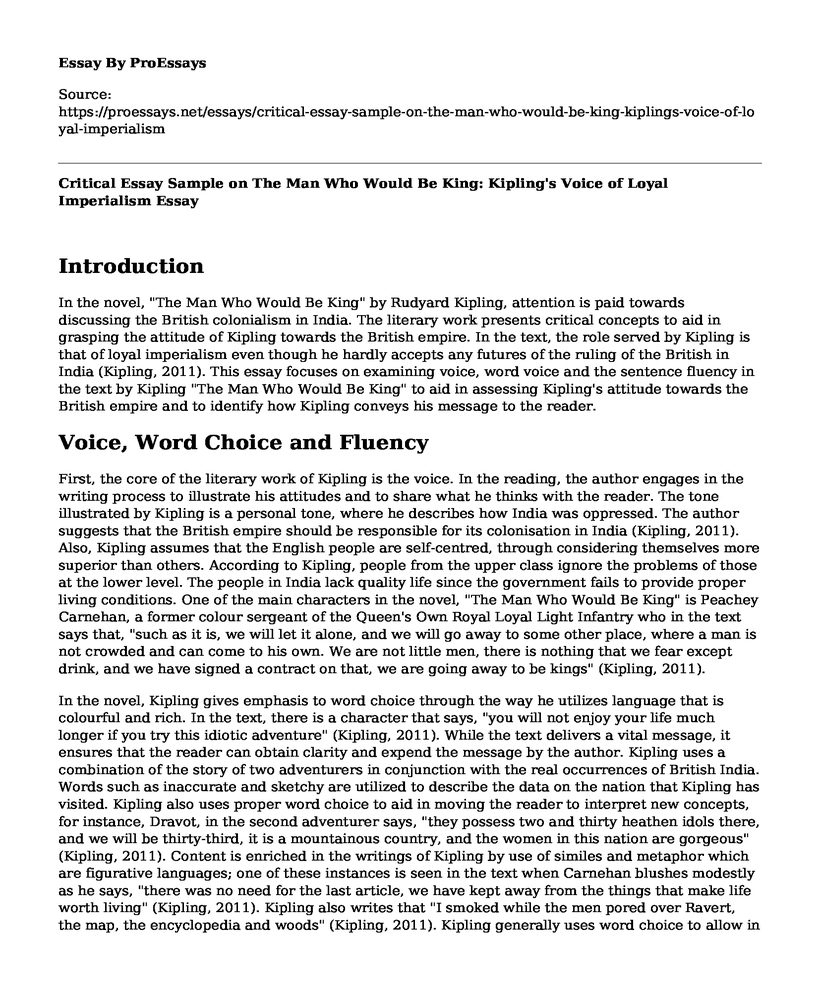Introduction
In the novel, "The Man Who Would Be King" by Rudyard Kipling, attention is paid towards discussing the British colonialism in India. The literary work presents critical concepts to aid in grasping the attitude of Kipling towards the British empire. In the text, the role served by Kipling is that of loyal imperialism even though he hardly accepts any futures of the ruling of the British in India (Kipling, 2011). This essay focuses on examining voice, word voice and the sentence fluency in the text by Kipling "The Man Who Would Be King" to aid in assessing Kipling's attitude towards the British empire and to identify how Kipling conveys his message to the reader.
Voice, Word Choice and Fluency
First, the core of the literary work of Kipling is the voice. In the reading, the author engages in the writing process to illustrate his attitudes and to share what he thinks with the reader. The tone illustrated by Kipling is a personal tone, where he describes how India was oppressed. The author suggests that the British empire should be responsible for its colonisation in India (Kipling, 2011). Also, Kipling assumes that the English people are self-centred, through considering themselves more superior than others. According to Kipling, people from the upper class ignore the problems of those at the lower level. The people in India lack quality life since the government fails to provide proper living conditions. One of the main characters in the novel, "The Man Who Would Be King" is Peachey Carnehan, a former colour sergeant of the Queen's Own Royal Loyal Light Infantry who in the text says that, "such as it is, we will let it alone, and we will go away to some other place, where a man is not crowded and can come to his own. We are not little men, there is nothing that we fear except drink, and we have signed a contract on that, we are going away to be kings" (Kipling, 2011).
In the novel, Kipling gives emphasis to word choice through the way he utilizes language that is colourful and rich. In the text, there is a character that says, "you will not enjoy your life much longer if you try this idiotic adventure" (Kipling, 2011). While the text delivers a vital message, it ensures that the reader can obtain clarity and expend the message by the author. Kipling uses a combination of the story of two adventurers in conjunction with the real occurrences of British India. Words such as inaccurate and sketchy are utilized to describe the data on the nation that Kipling has visited. Kipling also uses proper word choice to aid in moving the reader to interpret new concepts, for instance, Dravot, in the second adventurer says, "they possess two and thirty heathen idols there, and we will be thirty-third, it is a mountainous country, and the women in this nation are gorgeous" (Kipling, 2011). Content is enriched in the writings of Kipling by use of similes and metaphor which are figurative languages; one of these instances is seen in the text when Carnehan blushes modestly as he says, "there was no need for the last article, we have kept away from the things that make life worth living" (Kipling, 2011). Kipling also writes that "I smoked while the men pored over Ravert, the map, the encyclopedia and woods" (Kipling, 2011). Kipling generally uses word choice to allow in shaping his tone.
Kipling utilizes fluency in his text through distinct language strategies. In the novel, there is the utilization of rhythm and language flow by selecting sounds and word patterns properly. The message portrayed by Kipling is easy to understand based on how well it flows. The writings by Kipling ca be categorized as fluent since the degree of power in each word is given by movement and rhythm. Most of the sentences are distinct in length; for instance, in the sentence, "the intermediate class, and the population are either Intermediate, which is Eurasian or native, which for long night journey is nasty or loafer, which amusing through intoxicated" (Kipling, 2011). He text utilizes repetition to issue accurate population analysis. Kipling crafts his sentences properly to aid the reader in moving through the passages smoothly.
Conclusion
Through using voice, word voice and language fluency in his Novel, "The Man Who Would Be King", Kipling outlines his ideas concerning the impacts of imperialism. The attitude portrayed by Kipling on the British Empire is loyal. Also, Kipling showcases the oppression of Indians based on the fact that the British colonialism had dominated the nation. Kipling critiques how ignorant the British people are towards the oppressed Indian population, primarily through considering native India to be a population of lost tribes and yet perceiving them as English people under the rule of the British.
References
Kipling, R. (2011). The Man Who Would Be King: Selected Stories of Rudyard Kipling: Selected Stories of Rudyard Kipling. Penguin UK. Retrieved from https://www.amazon.com/Man-Who-Would-Be-King/dp/0141442352
Cite this page
Critical Essay Sample on The Man Who Would Be King: Kipling's Voice of Loyal Imperialism. (2023, Apr 10). Retrieved from https://proessays.net/essays/critical-essay-sample-on-the-man-who-would-be-king-kiplings-voice-of-loyal-imperialism
If you are the original author of this essay and no longer wish to have it published on the ProEssays website, please click below to request its removal:
- The Growth of Hamlet: Literary Analysis Essay
- World of Crime in Great Expectations Essay
- Book Analysis Essay on the Kingdom of Matthias: A Story of Sex and Salvation
- Essay Sample on The Wrath of Achilles and its Role in the Iliad
- Essay Example on Poverty and Esperanza's Family: Exploring 'The House on Mango Street'
- Paper Example on Oedipus: A Tale of Determination, Brilliance, and Pride
- Anthem - Literary Analysis Essay







